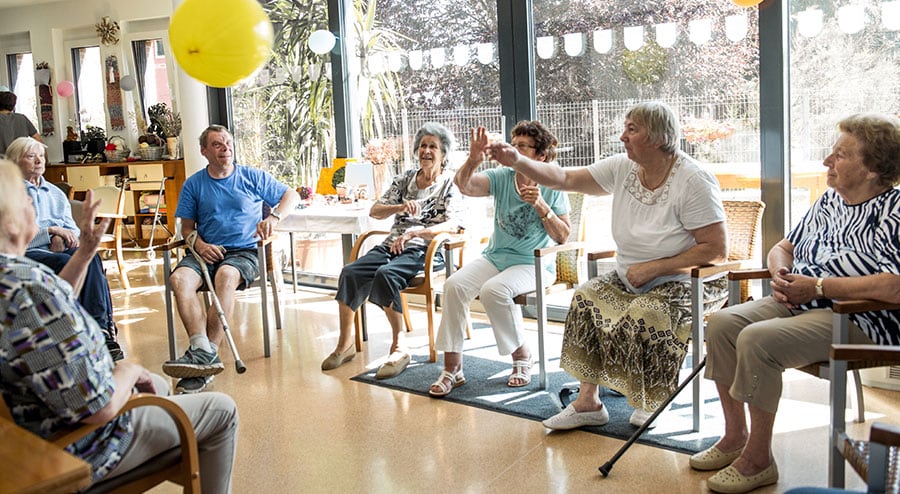Discover the advantages of Assisted Living for aging adults.
Discover the advantages of Assisted Living for aging adults.
Blog Article
Helped Living: a Compassionate Setting for Senior Citizens With Memory Challenges
By supplying personalized treatment and organized routines, these areas not only boost cognitive function however likewise foster psychological connections, lowering seclusion amongst locals. The performance of these interventions commonly hinges on the involvement of households in the care procedure, triggering a more detailed examination of exactly how this collective effort affects results for both locals and enjoyed ones.
Recognizing Memory Challenges
Recognizing memory challenges is necessary for providing reliable treatment to senior citizens encountering cognitive decline. Memory problems, which can manifest as forgetfulness, confusion, or problem recalling current events, are usually signs of problems such as Alzheimer's illness or other types of mental deterioration. These obstacles can considerably affect an elderly's capability to execute day-to-day tasks, preserve social partnerships, and manage personal security.
Acknowledging the numerous stages of cognitive decrease is crucial for caretakers and medical care professionals. Early-stage memory loss may involve mild forgetfulness, while mid-stage decline can lead to more pronounced disorientation and confusion. In late-stage dementia, individuals may lose the capability to connect effectively, needing detailed assistance and understanding from caregivers.
This necessitates a compassionate approach to care that focuses on the psychological health of the person. Inevitably, a deep understanding of these difficulties is essential to providing thoughtful and effective care for senior citizens encountering cognitive decline.
Benefits of Assisted Living
Assisted living offers various advantages for senior citizens with memory challenges, offering a helpful atmosphere that fosters freedom while guaranteeing security and treatment. Among the main benefits is the day-and-night supervision and support offered, which aids alleviate threats connected with memory-related concerns. Assisted Living. This constant support enables senior citizens to engage in day-to-day activities without the worry of accidents or confusion
Furthermore, helped living facilities commonly offer organized regimens that can boost cognitive function and security. These regimens help locals feel even more safe and lower stress and anxiety, as they recognize what to anticipate every day. Social interaction is another significant advantage, as these atmospheres encourage connections among citizens, promoting emotional health and decreasing feelings of seclusion.
Additionally, aided living team are trained to recognize the special demands of elders with memory obstacles, allowing for customized treatment strategies that resolve individual choices and requirements. This tailored strategy not only improves the quality of care however also empowers senior citizens to keep a sense of autonomy. In general, assisted living works as a compassionate service, balancing the requirement for assistance with the wish for self-reliance in the lives of elders facing memory challenges.
Specialized Care Approaches
Carrying out specialized treatment techniques is crucial for efficiently supporting elders with memory difficulties. One basic method is person-centered care, which emphasizes the value of recognizing each local's life history, choices, and values.
Another crucial method includes using cognitive stimulation therapies. Tasks designed to boost memory recall, motivate social communication, and advertise mental dexterity can substantially impact citizens' overall health. Methods such as memory therapy utilize personal memories to trigger conversation and link, while music treatment can stimulate feelings and memories, giving comfort.

Creating a Helpful Area
(Dementia Care Charlotte)An encouraging area plays a crucial role in improving the lives of elders with memory challenges. Such an area fosters an environment of understanding, empathy, and inspiration, which is important for people facing cognitive problems. By developing a network of support, helped living centers can considerably enhance the quality of life for locals.
Central to a supportive neighborhood is the presence of trained personnel that are delicate to the unique requirements of elders with memory impairments. These professionals not only provide necessary care however additionally engage locals in purposeful activities that promote cognitive function and promote social interaction. Programs that encourage engagement in team exercises, arts and crafts, or memory video games can boost both physical and mental health.
Additionally, an encouraging area advertises solid links among citizens. Urging friendships and peer assistance assists to lower feelings of isolation and promotes a sense of belonging. Routine gatherings and common dining experiences can further strengthen these bonds, developing an ambience where senior citizens feel valued and comprehended.
Involving Family Members in Treatment
Engaging families in the care process is essential for offering detailed support to senior citizens with memory challenges. Family members frequently work as vital supporters, using understandings right into the individual's choices, history, and routines that can boost customized treatment. By including them in conversations and care planning, helped living facilities can create a more holistic strategy that reverberates with the citizen's needs.

Encouraging family members to get involved in treatment not only improves the wellness of the elderly but also gives emotional support to relative. Involving family members in treatment grows a sense of community and belonging, guaranteeing that senior citizens feel linked to their enjoyed ones. Inevitably, a collective strategy to care enriches the lives of both homeowners and their households, creating a thoughtful and encouraging environment that promotes dignity and regard.
Final Thought
In conclusion, aided living serves as a crucial source for elders experiencing memory challenges, here are the findings using customized treatment customized to specific demands. By involving households in the treatment process, helped living produces a thorough assistance network, ultimately improving the lives of residents and their loved ones.
Report this page